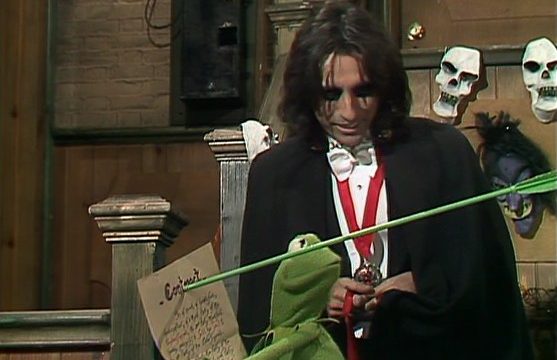Now, it’s true that The Muppet Show was never really a kids’ show. “Family,” we can do, but a lot of the humour on the show is for adults. Still, it tends to take people by surprise that there is an episode wherein Alice Cooper is trying to persuade assorted Muppets to sell their souls to the Devil, because that sort of thing just doesn’t happen in kids’ programming. Except it does. All the time. Oh, it’s not always an explicit Devil, but sometimes, it is?
The Faustian bargain is a staple of literature that, of course, predates Faust. Still, that’s how we think of it now. And if, say, “The Little Mermaid” has roots that are far older than Goethe, it’s still true that, when Ariel signs on the dotted line, it conjures up a very specific image even if Ursula herself isn’t truly demonic. A better example from the Disney canon is Dr. Facilier, who himself has made the bargain and appears to have to encourage others to do the same in order to keep himself in the good graces of his Friends on the Other Side. There are several made-for-Disney Channel movies with variations of the plot. And that’s just Disney. There are dozens of non-Disney examples as well.
Why? Yes, okay, the Deal With the Devil is an enduring trope of Western folklore, and it’s part of literature going back centuries. However, we are well over a century into the idea of kids’ entertainment as a distinct form, and if anything there are more explicit deals with devils than there were when my mom was a kid. Why would My Little Pony: Friendship Is Magic and Ben 10: Ultimate Alien use the concept? Apparently Degrassi: The Next Generation has a character who’s basically just the Canadian junior high equivalent of Satan, and that’s weird if funny to think about.
With adults, it makes a little sense. We’re expected to know the basic underpinnings of the mythos, and it’s incredibly funny to see Dan Fielding of Night Court, who doesn’t even believe in . . . well, anything, really, freak out more and more over the little man who claims to own his soul now. As for The Simpsons, they never met a version of the story they didn’t like and couldn’t play with. Urban fantasy such as The Dresden Files has the idea baked in; even if you don’t have a literal Devil, you certainly have figures who will serve the same role. It’s fun and easy and you don’t have to explain what you’re doing.
But part of why you don’t have to explain what you’re doing is that we grew up with the idea as children. You’d have to be pretty sheltered to make it to adulthood these days without familiarity with the trope. Possibly it’s being used as a cautionary tale—after all, that’s its roots in mythology, I suppose. Be careful of the person who claims they can give you anything you want. Read contracts carefully. Everything comes with a price. My kids don’t really understand the concept of souls, but they sure do know to avoid contracts with shady characters in red.
I wouldn’t exactly sell my soul to do better on Patreon or Ko-fi, but it would be nice?


